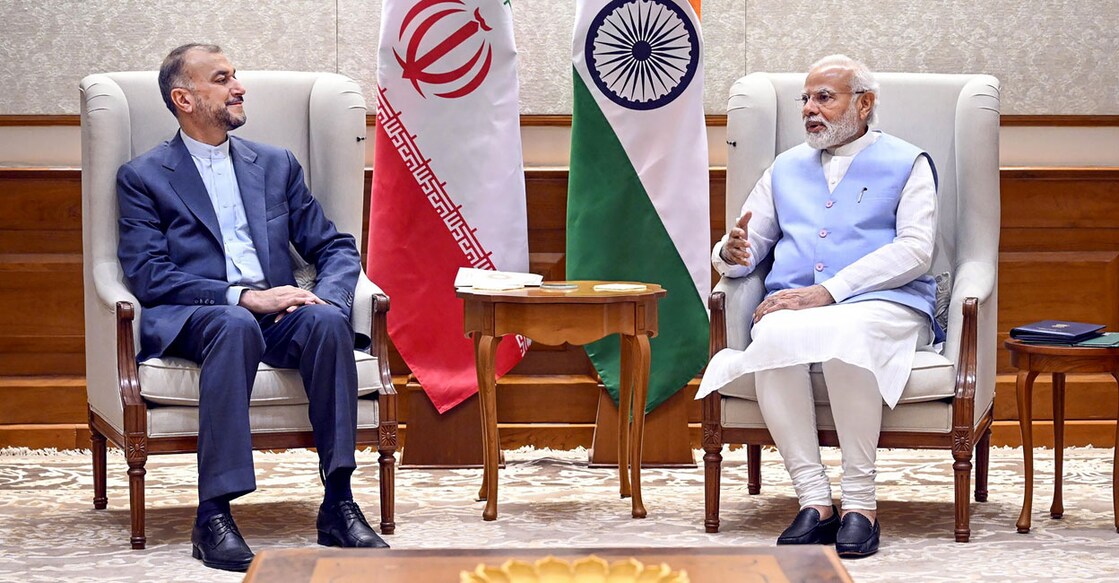Iran's Foreign Minister raises issue of 'negative atmosphere' in India triggered by insult on Prophet

Mail This Article
New Delhi: India and Iran on Wednesday held wide-ranging talks focusing on enhancing trade, connectivity and counter-terror cooperation even as Iranian Foreign Minister Hossein Amir-Abdollahian raised the issue of controversial remarks on Prophet Mohammad made by two former BJP spokespersons.
The crisis in Ukraine and the situation in Afghanistan were among the key issues that figured in the talks between External Affairs Minister S Jaishankar and Abdollahian who is on a three-day visit to India.
The two sides also signed an agreement on mutual legal assistance in civil and commercial matters.
The Iranian Foreign Minister also held talks with National Security Advisor Ajit Doval and the discussions centered around enhancing connectivity through the Chabahar port, boosting trade and investment ties and expansion of cooperation in education and research.
There were no details from the Indian side on the meeting between Doval and Abdollahian.
An Iranian readout said Abdollahian raised the issue of the "negative atmosphere" triggered by "disrespectful" comments on the Prophet and that the Indian side reiterated the Indian government's respect for the founder of Islam.
It said Abdollahian praised the Indian people and the government for their respect for religions, especially for the Prophet.
The readout mentioned that the Indian side in its response said that the defendants will be dealt appropriately.
The readout said the Iranian foreign minister also referred to coexistence of various religions in India, besides mentioning the historical friendship between the followers of various religions in the country.
The BJP on Sunday suspended its national spokesperson Nupur Sharma and expelled the party's Delhi unit media head Naveen Jindal for allegedly making derogatory comments.
Iran's IRNA news agency quoted Abdollahian as saying ahead of the talks that his trip to India is taking place in a situation in which a member of a party "insulted" Prophet Muhammad in an arbitrary act.
He said India has "constantly followed up peaceful coexistence and tried to live in peace and tranquillity" and noted that "Muslims cannot tolerate the sacrilege of the Prophet of Islam at all," according to IRNA.
It said Abdollahian described the security and military relations between the two countries as "appropriate" and called for further expansion of the cooperation and the "use of capacities to counter terrorism at the bilateral and regional levels and to help the people of Afghanistan."
The talks between Jaishankar and Abdollahian focused on overall bilateral ties.
"Wide ranging discussion with FM @Amirabdolahian of Iran. Reviewed our bilateral cooperation, including in trade, connectivity, health and people to people ties. Exchanged views on global and regional issues including JCPOA, Afghanistan and Ukraine," Jaishankar tweeted.
It is the first visit to India by a senior minister of a member nation of the Organisation of Islamic Cooperation after the controversial remarks triggered anguish in the Arab world.
Abdollahian's visit to India came days after Iran joined Kuwait and Qatar in summoning the Indian ambassadors over the remarks against Prophet Mohammed by Nupur Sharma and Naveen Jindal.
Since then, several countries including Saudi Arabia, United Arab Emirates (UAE), Indonesia, Pakistan, Afghanistan, Jordan, Bahrain, Maldives, Malaysia, Oman, Iraq and Libya denounced the comments.
The Iran nuclear deal also figured in the talks.
The Joint Comprehensive Plan of Action (JCPOA), commonly known as the Iran nuclear deal, was finalised in 2015 between Tehran and several world powers, including the EU.
It was aimed at curbing Iran's nuclear ambitions. The US had withdrawn from the deal in May 2018 and reimposed sanctions on Iran. There have been fresh efforts now to restore the deal.
Iran has been a key country for India in the Gulf region.
The two sides have been jointly focusing on improving connectivity between South East Asia and Central Asia.
At a connectivity conference in Tashkent last July, Jaishankar projected Iran's Chabahar Port as a key regional transit hub.
Located in the Sistan-Balochistan province on the energy-rich Iran's southern coast, the Chabahar port is being developed by India, Iran and Afghanistan to boost connectivity and trade ties.
India has been in touch with Iran over the developments in Afghanistan following its takeover by the Taliban on August 15.
The Iranian National Security Advisor had attended a regional conclave hosted by India in November on the Afghan crisis.
The conclave was also attended by NSAs of Russia, Kazakhstan, Kyrgyzstan, Tajikistan, Turkmenistan and Uzbekistan.

